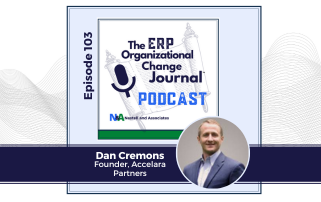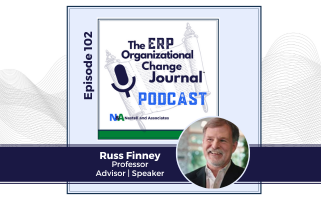About this Episode
We discuss building an ERP strategy and roadmap with Lisa Highfield. The title of this episode is based on a webinar provided by Lisa and her colleague Hong Kwok. We explore sound ERP strategies that lay the foundation for all other aspects of the ERP organizational change effort.
ERP systems can have a significant impact on organizational performance (positive and negative). Therefore, a sound ERP strategy and roadmap have a crucial role to play in organizational success. A highlighted awareness and value placed on proper ERP strategy promotes and advocates for ERP success. In fact, some ERP research suggests that conflict over ERP organizational change strategy can lead to failed efforts as well as increased project costs and failure to deliver anticipated benefits. So, in this episode, let’s learn more about building an ERP strategy!
More About Lisa
Lisa Highfield is a technology and business leader helping organizations connect people, strategy, innovation, and technology to desired business outcomes.
Lisa’s experience spans over 24 years in IT systems administration, IT consulting, and operations management, leading information technology, human resources, and finance functions. Lisa has extensive experience in multiple industries, including automotive, higher education, manufacturing, and financial services, where she held various leadership positions. Lisa has a passion for helping businesses achieve organizational excellence. She has led organizations through transformation initiatives and has supported and implemented numerous enterprise applications. Lisa has a strong passion for culture and the people that support our organizations.
Lisa holds an EMBA in Global Business, a BSc, and post-graduate diplomas in both Information Technology and Human Resources.
Website: www.infotech.com
Episode Highlights Timeline
03:13 How would you define ERP?
03:57 It states on the Info-tech website that “Organizations often do not have an ERP strategy and roadmap in place. The focus is often on selection and implementation phases of ERP, but without a foundation and strategy in place, ERP projects are routinely reported as going over budget and, in most cases, they fail. The success of an ERP project is completely dependent on establishing and maintaining a strategic and actionable roadmap.” What exactly is a roadmap, and what makes it a good one? How does a strategy differ from a roadmap? And how does a strategy differ from a roadmap?
06:40 The ERP strategy needs to consider organizational goals, business needs/requirements, environmental factors, technology drivers, and internal (and external) barriers and enablers. But what are some of the items that organizations can do tactically to make sure that the ERP strategy is aligned with the corporate strategy? And this needs to happen not just at the leadership level but amongst all stakeholder groups.
08:42 A full Roadmap also needs to consider all aspects of an ERP endeavor to include strategy, selection, implementation, and optimization. So, the intent of a strategy is to “lay the strategic foundation that aligns organizational goals, business needs, and technology drivers”. The strategy lays the foundation for all other aspects of the change. Fair statement?
09:27 You mentioned on the webinar that “statistical analysis of ERP projects indicates rates of failure vary from 50 to 70%”. So, part of a good strategy means defining, aligning, and communicating what success is. So, suppose you are leading a kickoff meeting for an organization that is just starting an ERP implementation. How would you generally define and describe for them “success” in terms of an ERP organizational change?
13:03 You also mention that “companies that apply the principles of behavioral economics outperform their peers by 85% in sales and more than 25% in gross margin.” What do you mean by behavioral economics and how is this relevant to ERP strategy? (*This is s a good one!)
15:55 I am going to quote you because this is so true and relevant when creating and EPR strategy, you state in your Infotech webinar that “the health of the system isn’t always monitored”. Why is this idea important to an ERP strategy?
19:19 as you know, one has to be very clear at the onset and through the entire implementation lifecycle as to “why are we doing this?” and that “Each stage of the project will be difficult and present its own unique challenges and failure points. Re-evaluate if you lose sight of the why at any stage in the project.” Please explain further for our listeners.
21:34 What about process and technology maturity in an ERP strategy? In developing an ERP strategy, what roles does understanding current pain points play? Can you share with our listeners what a business capability map is and what is its relevance to building ad ERP strategy and ERP implementation?
26:23 All ERP projects should have a project champion, project advisor, Steering committee, project manager, project team, subject matter experts (internal and external), and change management specialist at minimum. How do you find the balance in terms of size of teams and who to include? How do you identify which stakeholder to include and what their role of involvement should be during requirements gathering?
29:37 What can you say about risks and contingency plans and what role would they play In an ERP strategy and roadmap? What would you say are the biggest sources of risk in an ERP strategy?
30:38 You mention a good point in the webinar about choosing the right state for the organization meaning to get from the current to future state may involve maintaining the current systems, augment current system, optimize, or transform *(good points). I believe that this is the number one first conversation in an ERP strategy conversation. Can you share with our listeners what you mean by this?
35:35 When you go through an ERP strategy and roadmap process, are there even any conflicts? Or is it more typical that is “kumbaya” process and easy?
36:58 Lastly Lisa, If you were going to give advice, or one golden nugget, to an organization preparing for an ERP implementation (or improvements) what little golden nugget would you like to leave with our listeners?
More Episodes & Blog Posts Like This
- Episode 68: ERP Success Factors: Practitioner Pointers with guest David Ogilvie
- Episode 67: ERP Success: Practitioner Insights with guest Brett Beaubouef
- Episode 56: ERP Organizational Change: Strategy and Alignment with guest Greg Taffet
- Episode 46: ERP Organizational Change: Process, Practice, and Management with guest David Amborski
- Episode 31: ERP: A Practitioners View with guest Bob Bucy
- Episode 20: Winning the ERP Game with guest David Stefanick
- Episode 18: Modern ERP: Select, Implement and Use Today’s Advanced Business Systems with guest Dr. Marianne Bradford
- Episode 6: ERP Organizational Change Success Factors with guest Dr. Justin Goldston
-
ERP Consultants Need to Think Differently About How We Approach Our Trade
Latest Episodes
Human Capital in PE-Backed Companies: Strategies for Leadership and Talent Management
Human Capital in PE-Backed Companies: Strategies for Leadership and Talent ManagementEpisode Overview - PE-backed Human Capital Strategies Today’s episode centers on the pivotal role of human capital in PE-backed companies, emphasizing how strategic leadership and...
ERP Organizational Change: Technology Strategy
ERP Organizational Change: Technology Strategy and Keys to SuccessEpisode Overview - Technology Strategy In general, at the highest level of categorization, there seems to be consensus on the importance of people and culture, informational technology, and project...
AI and Private Equity Synergy: Fueling Business Transformation
AI and Private Equity Synergy: Fueling Business TransformationEpisode Overview - AI in PE Strategies In this episode, we explore how AI and Private Equity synergies are fueling business transformations and reshaping investment strategies and operational efficiencies....
About Nestell & Associates
Where People, Processes, and Technology Align
Nestell & Associates is a strategy and management firm. We can help you take your portfolio companies to the next level by demonstrating how to execute a scalable, methodical, and disciplined approach to ERP Organizational Change and Digital Transformation success.






0 Comments